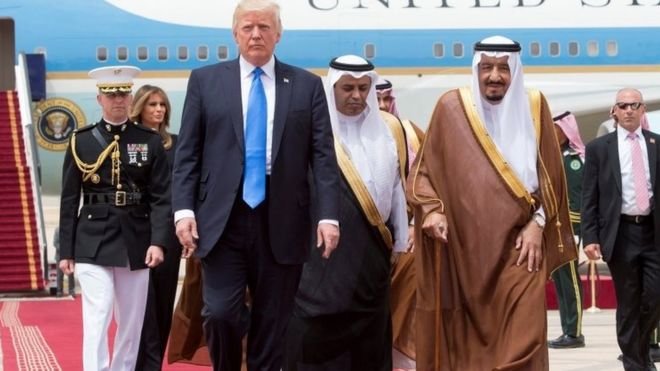Common Concern of the White House and Riyadh

TEHRAN _ In recent days, American and Saudi authorities have common security concerns. The defeat of notorious terrorists of ISIS has hit Washington and Riyadh hard. However, the issue is not limited to the military and regional dimension. Part of the issue is the Takfiri thinking with the support of the United States and the Saudi family behind it.
Why is Wahhabi thinking supported by the United States and Saudi Arabia? What are the consequences and effects of supporting this thinking in the future? Will this overlap between the United States and Saudi Arabia continue forever? These are questions that answering them requires a deep contemplation on the current situation of the region.
The fact is that the U.S. authorities, as well as their Western, Arab, and Zionist allies, are deeply concerned about the developments that are taking place in Syria. The destruction of the ISIS caliphate in cities and regions such as Raqqa, Abu Kamal and other strategic cities in Syria is the outset of proud days for the Resistance Front. This is while Washington and its allies see all their investment in the region gone.
These investments include the intellectual and cultural assets of Washington and Riyadh. One of the main reasons for the common support of the United States and Saudi Arabia for the Wahhabi, or more generally, Takfiri thinking, is to confront resistance thinking and the prevalence of this dynamic thinking in the public opinion of the region. Therefore, the joint efforts of the White House and the Saudis to strengthen the Takfiris are rooted in their common concern over the dynamic thinking of resistance.
What is certain is that one of the main concerns of the United States in the region (especially Syria and Iraq) is about the emergence of popular mobilization thinking in this country. Such thinking has never existed before the occupation and warfare of the United States in different cities of Syria. Under such circumstances, the United States intends to confront the Resistance Front by redefining the remains of ISIS and other Takfiri groups. But the Resistance Front will certainly pass this stage with success in future and defeat the disbelief and atheism once again.
Another issue to be addressed in this regard is the general interest of Iraqi and Syrian citizens in Resistance thinking. Undoubtedly, the Resistance thinking isn't a variable which depends on the military fighting with ISIS and other U.S.-affiliated terrorist groups. This thinking will live in the future in countries like Iraq and Syria. This is the one thing that worries the United States and Saudi Arabia. After the U.S. led terrorists of ISIS committed lots of crimes in Syria, the popular mobilized forces in Syria, like the popular forces in Iraq, started to fight alongside the army to expel ISIS from the occupied territories.Washington has a difficult time now.
On the one hand, ISIS, as the U.S. puppet, has no longer a caliphate or any power, and on the other hand, the emergence of Resistance thinking in countries like Syria and Iraq is now more highlighted than ever. Besides, Zionist authorities, over the past few days, have repeatedly declared their concern over the continued presence of the Resistance forces on the Golan border. These concerns indicate how much Washington and Tel Aviv are worried about the influence of the current of Resistance in the region, and particularly in Syria. What is certain is that the effect of the Resistance Front's victory in the region is not limited to military dimensions and battlefield equations, but this great victory has led to the weakening of the process of reconciliation, and caused the strengthening of the Resistance movement in the public opinion of the region.
The next point that needs to be addressed in this regard is about the contrast between resistance thinking, and compromise and submission thinking. In recent years, Washington has invested heavily in promoting compromise thinking (in opposition to resistance thinking) in the region. What is certain is that the United States, no matter who is in power at the White House, is terrified about the emergence of resistance thinking on one hand and the weakening of concession and submission thinking in the region on the other.
After the U.S. presidential election in 2016 and the victory of Donald Trump, the White House's deep opposition to the popular mobilized forces continued in Iraq and elsewhere in the region. This opposition has reached a point that U.S.-led international coalition forces attacked the Hashad al-Sha'bi forces in Iraq on August 8 and murdered dozens of them.
Of course Pentagon and the White House were all silent about this murder, and censored its news in the media and tried to prevent the revealing of their true policies in the West Asia region (in support of ISIS and other Takfiri groups). However, it became clear to everyone that the opposition to the existence and activity of popular forces in the West Asia and the Muslim world, is considered the common denominator of the two Democratic and Republican parties in the United States.
On the one hand, the United States faces a phenomenon called the destruction of ISIS and, on the other hand, it's encountered with a simultaneous phenomenon called "the emergence of popular mobilization forces" in the region. The main question here is why Washington and its allies are opposing the emergence and extension of "mobilized thinking"? What's the reason behind their thorough confrontation with the "Syrian Popular Forces", "Hashad al-Sha'bi in Iraq", "Fatemiyoun Brigade", "Zainabiyoun Brigade", "Popular Forces of Yemen", and etc.?
Finally, the common support of the United States and Saudi Arabia for Wahhabi thinking will all the same continue. This is while the dynamics of resistance thinking will ultimately prevent the domination of the poisoned Wahhabi-Zionist thinking in the region.
Leave a Comment